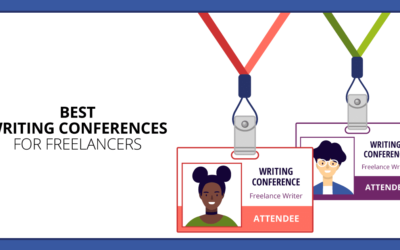
If you want to earn more as a freelancer, improving your writing productivity can be huge. I’ve recently coached two different writers who told me they doubled their income, just by getting more efficient with their work day.
Productivity gains can be truly transformative for your career.
But what if you’ve tried the apps, used the checklists, gotten up earlier…and still nothing? You spend much of the day in a fog, trying to get focused and take action.
I have a confession to make: Often, that used to be me.
Over the years, I’ve come up with some contrarian approaches to productivity out of necessity, as a staff writer who *had* to file 3-4 stories a week or lose my job.
If you feel like you’re spinning your wheels, and it takes all day to get one tiny thing accomplished, I have five ideas for you to try out:
1. Kill your list
Recently, a writer posted their goals for the month, for my review. They included:
- Get on and learn about LinkedIn
- Get on and learn about Twitter
- Finish my writer website
- Start a blog
- Send out queries
- Attend in-person networking
- Learn about Pinterest maybe?
Does that sound realistic to you, on top of writing for current freelance clients? Of course not.
There’s a ton to know about mastering each social media platform, not to mention the effort involved in conceptualizing and launching a blog. Which is apparently going to happen while you also pitch editors and do in-person networking?
Come on. I am the queen of having unrealistic expectations of how much I can get done, but that even sounded crazy to me.
In my coaching, I’ve discovered short lists are much more powerful and effective. Challenge yourself to pare down your ‘priority’ list of weekly or monthly goals to only your three top goals, or even just one. Try simplifying — it can leave you less overwhelmed and help you get more done.
Another way to quickly prioritize without getting bogged down ordering a long list is to call a friend and talk about what you need to get done. In conversation, you will naturally put the most important things first. Take notes, and you’ll have your priorities.
2. Stop organizing
Do you wake up every day frantic to get to your ‘top priorities’ — but at the end of the day, find you haven’t managed to get any of them done?
Here’s a tip: Stop making it a priority to figure out the priorities.
Let it go! And simply take action. Sometimes the task of organizing is simply another way of procrastinating.
If you make something a top priority on your list but it truly isn’t that important, your subconscious mind will rebel. You’ll find yourself poking around Facebook, watering the plants…anything but get to that supposedly urgent item.
Also, the act of prioritizing takes time — often, completely wasted time. Because in the end, we do what seems doable to us in the given moment, rather than being able to slavishly follow a priority list.
I’ve wasted too many hours on way too many days, because I felt compelled to prioritize, and then to be sure I’m doing things in order of importance. On days when I skip this and dive in, I get tons done. This has led me to declare my independence from the tyranny of compulsive prioritizing.
Instead of worrying about whether what you’re about to do is the ‘top’ goal, grab the thing most at hand. What could you do and put behind you, right now, that feels urgent?
Do it. Then, take the next thing that bubbles up into your consciousness, and knock it out. As you take things off our to-do list, your stress level goes down, and it becomes easier to keep on rolling and do more.
3. Ask one question
One of the reasons freelance writing is a difficult career to pursue is that there are so many possibilities. It’s easy to get bogged down.
If you’re confronted by a long list of options, ask yourself one important question:
We’ve all got ‘wanna-do’ lists, but you can cut through the clutter by asking yourself which of these is the most direct path to earning. That should clarify your top priority. Do what will most help your business first.
4. Go with your natural flow
Once, years ago, my husband worked on a documentary about chronobiology. Learning about this concept made a deep impression on me, because I knew I had times of day when I was naturally far more creative and able to write. At last, a productivity key that made sense!
Some of us can write the Great American Novel in the hour before the kids get up, or while riding the bus home from work. Others are on fire from 9 p.m. to midnight. Personally, I often feel like my head is stuffed with cotton balls around 2-3 pm.
As freelancers, we’re able to set our own schedules. We can work according to our chronobiology. For me, the ideal schedule these days includes getting up fairly early, taking a 15-minute nap in the early afternoon (impossible at most day jobs!), getting some exercise nearly every day, and trying to quit writing by 4 p.m.
Efforts to squeeze in more work while my kids are around, and as evening falls, tend to go nowhere. I want my couple time, so my mind fights against evening writing sessions. And at this point, I’m old enough that late nights no longer work for me.
If you can tune into your natural rhythm and use it, you may cut a ton of inefficiency out of your day. Put your writing time where it happens most easily, do marketing at other times, and you’ll get a lot more done.
5. Stop comparing
If there’s one time-wasting thing freelance writers are obsessed with, it’s how other freelance writers do things, and how long it takes them to get it done.
In the past few weeks, I’ve had people ask me:
- How long it takes me to send 100 query letters out
- How long it takes me to write an article
- What percentage of my queries get a response
The list goes on. Know what the sad part is? The answers to these productivity questions will not help you.
It doesn’t matter how long it takes me, or the writer down the street, to write something. All that matters is how long it takes you to do it — and what you can do to cut your time down.
Stop worrying about how fast others are, and compete with your past level of efficiency. Look to improve it. Lather, rinse, repeat on that, and you will become more efficient. That’s all that matters.
Your mileage may vary
Our culture is currently obsessed with productivity. From what we read, you’d think all the other moms are decluttering for an hour daily and competing in triathlons while homeschooling their children and volunteering at the soup kitchen. It makes you feel like everyone else is getting 10 times more done than you do.
I suspect it’s a lie.
The fact is, all of us have ‘fallow’ days, weeks, or even months, when we’re less productive than our norm. We’re not machines, and we can’t just crank out great writing around the clock.
I wish I had a dime for every day I told my husband, “I feel like I didn’t manage to DO anything today!”
I must be getting something done sometime — for instance, I wrote a new, 100-page e-book and launched a mastermind program for bloggers earlier this year. But don’t ask me when or how!
My point is, even a small effort each day adds up over time, even if we ‘feel’ unproductive.
If you’re in a slack period, the best thing to do may be to simply forgive yourself for needing the down time. Then, try to use it to sow seeds for future projects.
Have you ever taken a trip, and suddenly found yourself jotting down tons of great ideas? Shaking up our norm and taking breaks can unleash a lot of creativity.
Remember, we don’t always know what may grow from ideas we have during down time. So don’t beat yourself up about it!
Sometimes, our bodies and minds need to recharge. Don’t fight that. Take the time you need, and you may soon find yourself more productive than ever.
What’s made you more productive? Share your tips in the comments.









